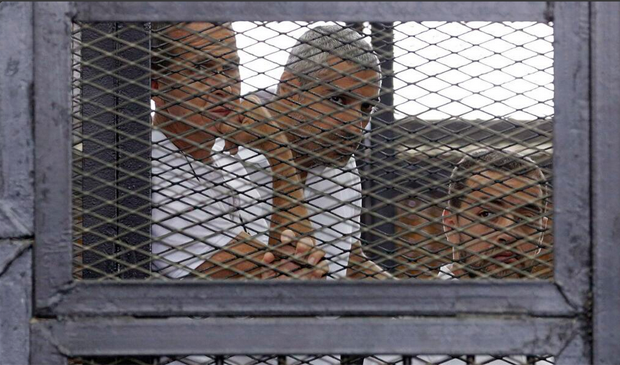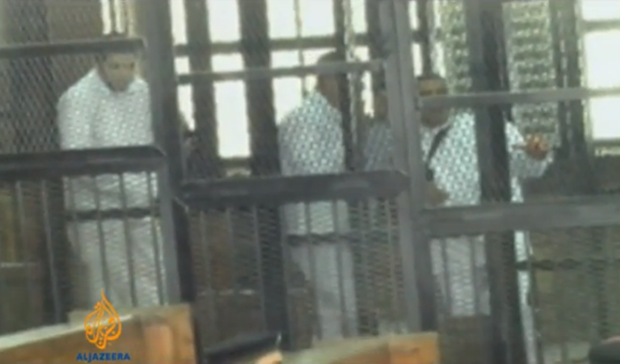Egypt: “Peter will not rest until his colleagues are freed”

Peter Greste, Mohamed Fadel Fahmy and Baher Mohamed are three Al Jazeera journalists were among those sentenced to prison on terrorism charges.
As journalist Peter Greste returns to Australia to a hero’s welcome home, his two colleagues Canadian-Egyptian journalist Mohamed Fadel Fahmy and Egyptian journalist Baher Mohamed languish in an Egyptian prison.
The three Al Jazeera English journalists have spent more than 400 days in jail for no other crime than doing their work. In June 2014, Cairo court sentenced Greste and Fahmy to seven years in prison while Baher was handed down a ten-year sentence on the charges of “spreading false news and supporting a terrorist group.” Baher was given the harsher sentence for allegedly having in his possession an empty shell case that he had picked up at a protest site.
Analysts said that Greste’s abrupt deportation to his native Australia was the result of immense international pressure and a persistent international campaign for his release. The move followed the issuance of Presidential Decree No. 104 some months earlier, allowing foreign detainees to be deported for retrial in their own countries. The decree issued by President Abdel Fattah El Sisi in November 2014 came in response to widespread criticism of Egypt’s brutal security crackdown on dissent and the stifling of free expression in the country where four years earlier, opposition activists had taken to the streets to demand “Freedom, Bread and Social Justice.”
Former MP Mostafa Bakry had posted a message on his Twitter account on Saturday night (the day before Greste boarded a flight home via Cyprus) stating that the Australian journalist would be released the following day. On Sunday, Bakry followed up his earlier tweet with another message saying that journalist Mohamed Fahmy (Al Jazeera English Cairo Bureau Chief) would also be freed after having his Egyptian nationality revoked. Negad El Borei, Fahmy’s Defence Lawyer meanwhile, told the independent Al Masry El Youm newspaper that while it was necessary by law that Fahmy drop his Egyptian nationality if he wished to be deported to Canada, Fahmy had not decided to do that. A source close to the presidency also denied allegations that the jailed journalist had been granted amnesty, calling the rumour “baseless and unfounded.” Fahmy, has repeatedly denied in court that he has any links with the outlawed Muslim Brotherhood, insisting he was “a patriot” and “would never do anything to harm Egypt’s national security.
Meanwhile, in a letter addressed to President Abdel Fattah El Sisi on Sunday, Fahmy’s mother, Waffa Bassiouny, pleaded for her son’s release on grounds of ill health.
“As a mother and an Egyptian citizen, I appeal to you Mr. President to pardon my son,” she wrote, adding that “Fahmy is innocent and needs urgent medical treatment for Hepatitis C and a shoulder injury.”
Fahmy had suffered from a dislocated shoulder before his arrest and detention in December 2013 but the lack of treatment (despite his repeated pleas to the judge overseeing the case for medical care) has left him with a permanent disability in his right arm. El Sisi had earlier insisted that Egypt’s judiciary was “independent” adding that he could not influence judicial verdicts and would only be able to pardon the detainees once the legal process had been exhausted. On January 1, 2015, the court ordered a retrial for the three journalists but has not yet set a date for the new trial.
While Peter Greste’s deportation has raised hopes for the imminent release of Fahmy (who has dual citizenship), Egyptian producer Baher Mohamed’s sttuation is somewhat more precarious. His case has received far less media attention than his two high-profile colleagues simply because of the fact that he is solely Egyptian, a case that Rights Lawyer El Borei said “underlines the discrimination in Egyptian legislation against local detainees.”
Egyptian media which has aligned itself with the military-backed authorities since the ouster of Islamist President Mohamed Morsi in July 2013, has remained largely silent about the case of the three AJE journalists, (referred to by some media as the “Marriott-cell case”) save for denunciation by some media of Al Jazeera, accusing the Qatari-funded news network of complicity with the outlawed “terror group.” The network has been banned in Egypt since the overthrow of the Islamist President and had its offices ransacked by security forces several times before the imposition of the ban. Before their arrest and detention at the end of December, 2013, the three journalists had worked without valid credentials out of a makeshift studio in the Marriott Hotel in Zamalek.
In a telephone call on Monday (a day after Greste’s release), Jehan Rashed, Baher’s wife who gave birth to their third baby in August last year while her husband was locked up behind bars, decried the country’s discriminatory policies against native Egyptians.
“I know that the two ‘foreign’ journalists will walk free while Baher will be left to bear the brunt of this whole case. He is paying a heavy price for simply being an Egyptian,” she told Index.
She also complained that prominent TV talk show presenter Lamis El Hadidi had the night before referred to Greste and Fahmy by name on her show on the privately-owned satellite channel CBC but had said she was not sure if the third detainee was named Baher.
“This kind of attitude is typical of the discrimination in the country against one of their own,” she said, sounding distraught.
Egyptian journalist Khaled El Balshy meanwhile told Index that members of the Journalists Syndicate had called for an emergency meeting on Tuesday to discuss possible measures to pile pressure on the authorities for the release of 11 journalists currently behind bars in Egypt, including both Baher and Mohamed Fahmy.
“We had previously signed a petition for their release which was presented to the authorities,” El Balshy told Index by telephone. “We feel that it is now time to send the government another reminder,” he added.
El Balshy did not rule out organizing a rally outside the Syndicate in the coming days to press for the release of the journalists whom he said “should be out doing their work instead of being locked up.”
Egypt was listed among the top ten worst jailers of journalists in the world in an annual report published last December by the New York-based Committee for the Protection of Journalists, CPJ. According to the CPJ report, Egypt had “more than doubled the number of journalists behind bars to at least 12 in 2014, including the three AJE journalists.”
While Egyptian citizens and the country’s pro-government media is paying little attention to Baher Mohamed, he is not forgotten by the international community and the foreign media. In reporting Greste’s release on Sunday, several foreign journalists working in Egypt reminded their audience that Greste’s two colleagues “must not be forgotten” and that “the campaign for their release is far from over.”
The plea was echoed by Greste’s family which vowed to continue its campaign until Fahmy and Baher were also released.
At a press conference in Brisbane on Sunday (held before Peter’s arrival home), Peter’s brother Andrew Greste said, “We want to acknowledge that Peter’s colleagues are still in jail.” His father Juris Greste also said that he “felt deeply for those left behind.”
“Peter will not rest until his colleagues are freed,” said Andrew.

